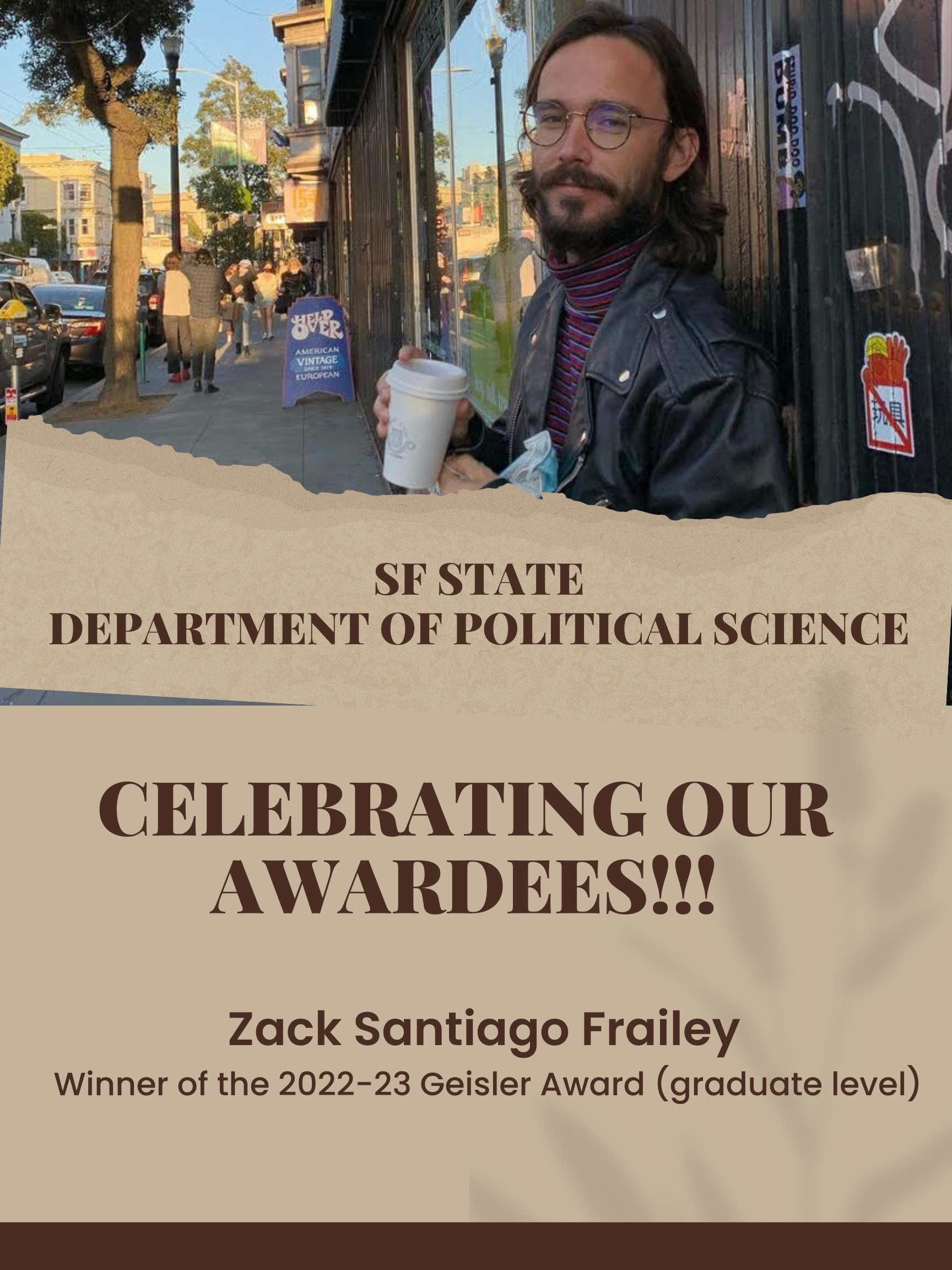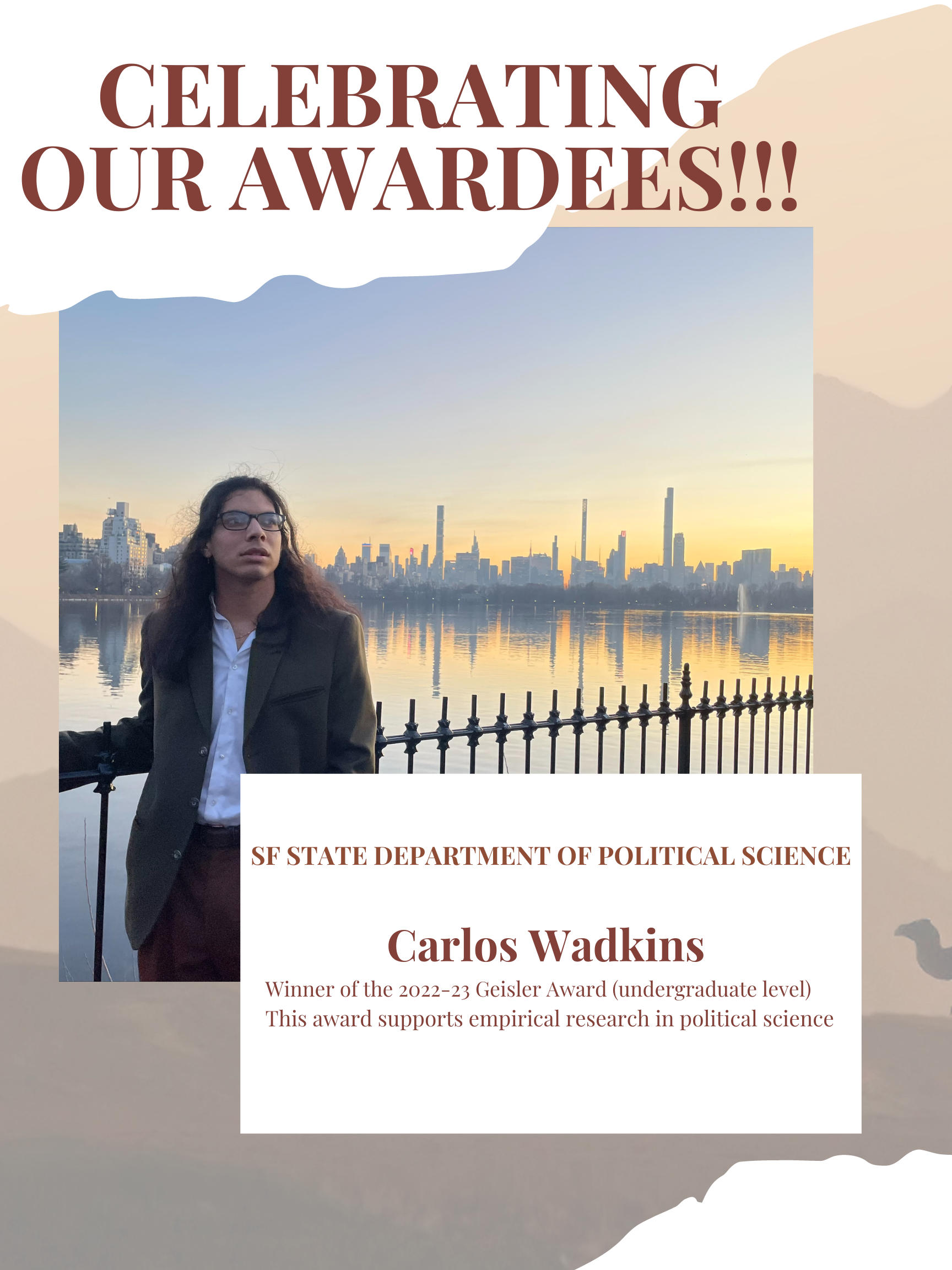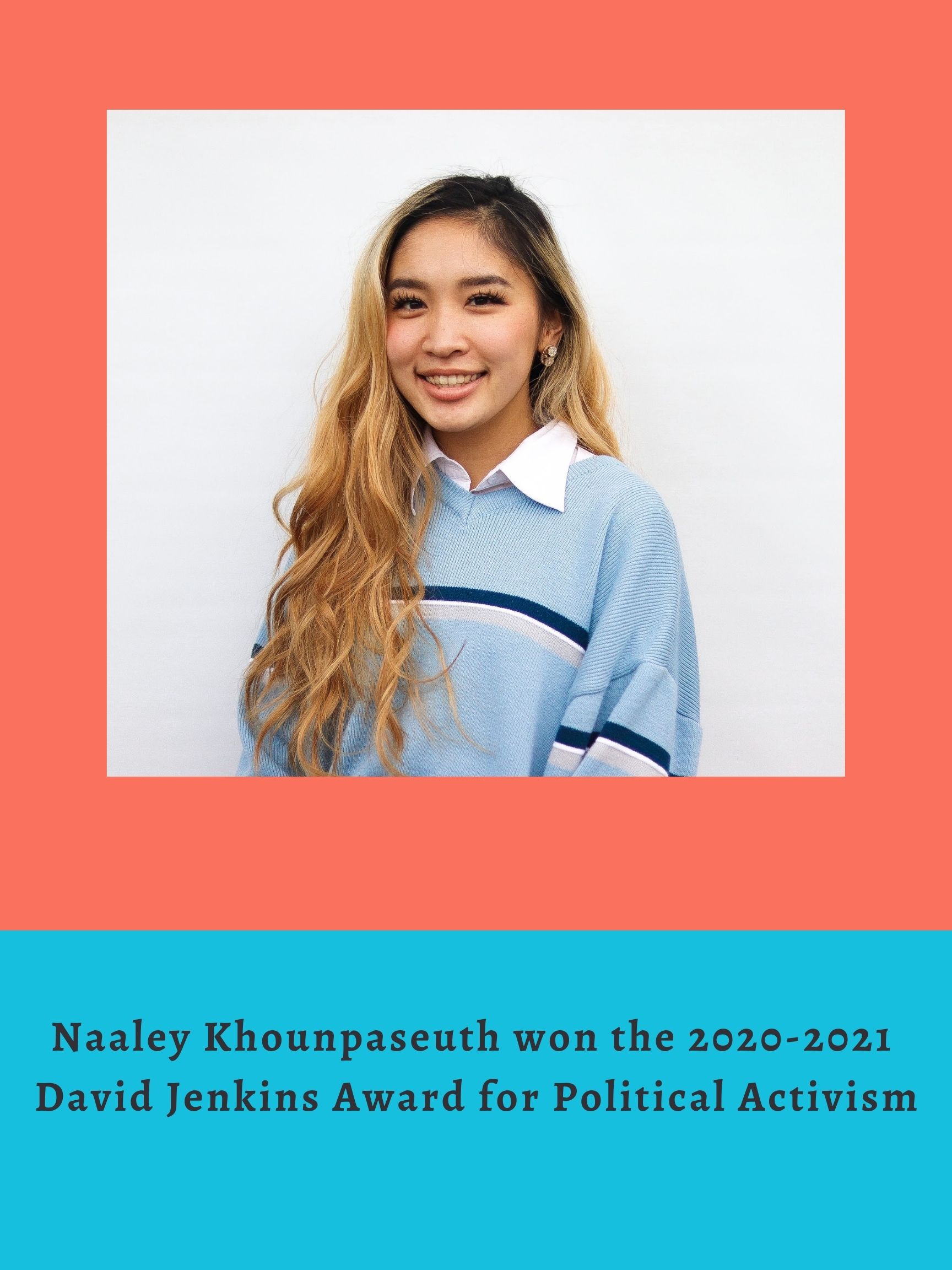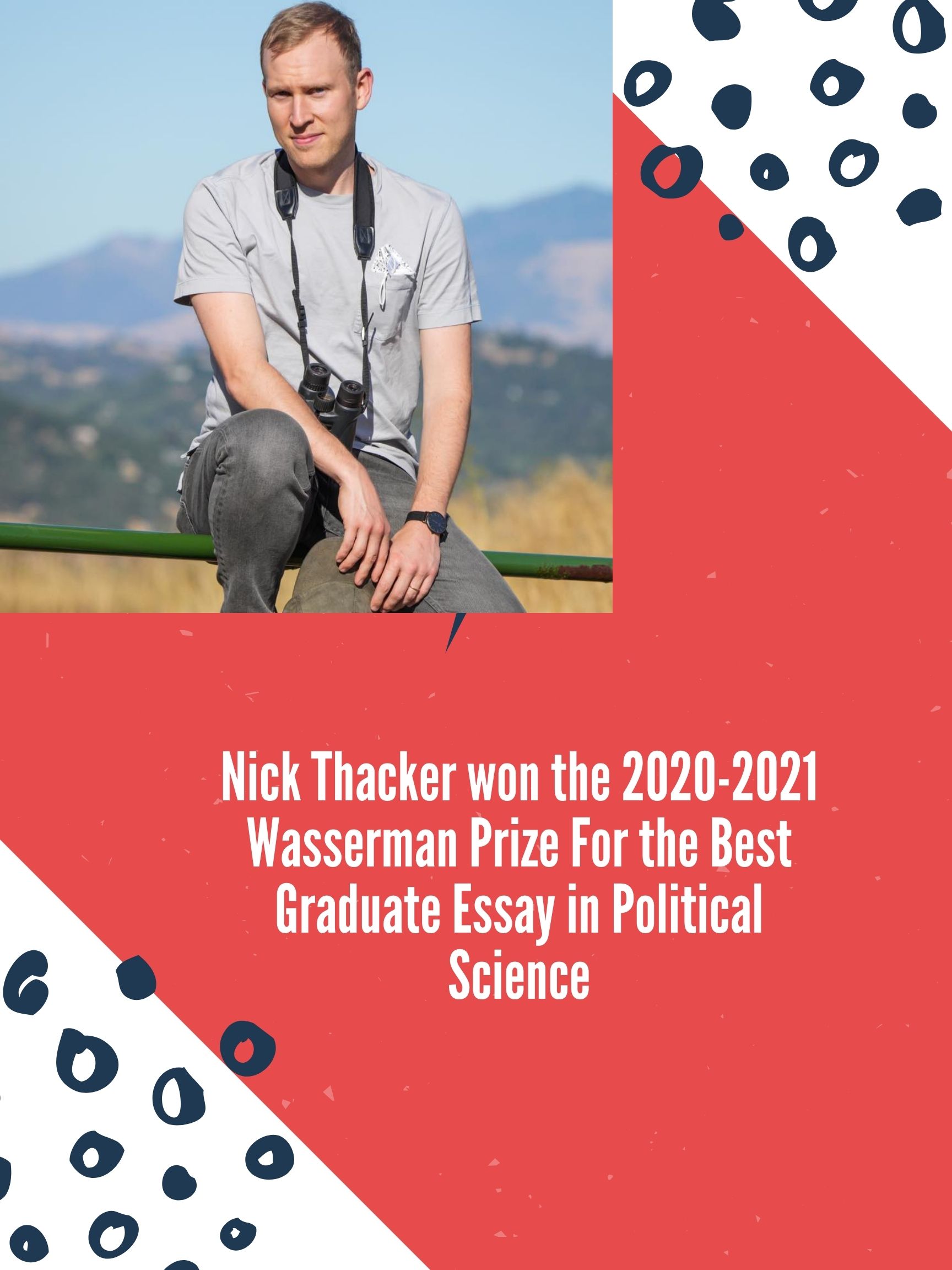The Department of Political Science offers several scholarships which are listed on this page. You can also view additional scholarships available on the College of Liberal & Creative Arts scholarship page. Go to Academic Works to apply for scholarships and to view full listings and deadlines.
* Not to be confused with the other Matt Stolz prize we currently offer for theory papers
*This fellowship will only cover the in-state tuition
This fellowship will cover a year's tuition* at SF State minus $27.50 a semester (the amount of tuition it cost Matt Stolz when he went to school).
This fellowship is based on two things a) financial need and b) demonstrated interest in political theory. It is intended for undergraduate political science majors to pay for their senior year at SF State and also for incoming or present M.A. graduate students in political science to pay either for their first or second year of graduate school.
To apply please give a copy of your transcripts indicating the courses in political theory that you have taken here and give some evidence of financial need, whether it is a financial aid form, or some other form of evidence.
Matthew F. Stolz Profile
Professor Matt Stolz taught political theory at SF State from 1967 to 2004. A Bay Area native, Prof. Stolz grew up in Oakland, attending Fremont High School and earning a bachelor’s degree (Phi Beta Kappa) and a doctorate from UC Berkeley. Prof. Stolz was a political theorist in the classical model of Plato and Aristotle, ever pushing himself, his students, and his colleagues into deeper levels of dialogue and self-interrogation.
He founded the SF State Political Theory Colloquium, a fluid community of graduate students, faculty members, and visiting scholars who immersed themselves in contemporary political theory. As a Scholar, Prof. Stolz published numerous articles on the New Left and the political philosophy of Hannah Arendt. He also translated his theory into action, participating in 1960s civil rights demonstrations and protests against the Vietnam and Iraq wars.
Prof. Stolz fully dedicated himself to his craft. In his nearly forty years at SF State, he mentored hundreds of budding political theorists, helping many of them publish their own work. His passion extended even to his final days, which he partly spent writing a series of essays on the political theory underlying John Adams and John Quincy Adams’s presidencies.
The purpose of this award is to support empirical political science and to promote empirical research among SF State Political Science students at the graduate level.
To apply students must:
- Be a M.A. political science major at SF State.
- Be enrolled in the spring semester
- Submit an original paper written within the past academic year that employs empirical methods
- Upload a paragraph that includes (a) whether you are an undergraduate or graduate student, (b) when you expect to complete your degree, and (c) when and where you wrote this paper -- what class? what year and semester? who was your professor/instructor?
Gene Geisler Profile
Professor Gene Geisler pioneered the use of computing in social sciences. He worked as a data analyst in Chicago in 1959 when SF State President Glenn S. Dumke came to the windy city on a faculty recruitment mission. President Dumke, impressed with Prof. Geisler, flew the young data scientist out to San Francisco for a job interview, which led to his more than 40-year tenure teaching political science at SF State.
Prof. Geisler’s computer science expertise earned him a position in the CSU Chancellor’s Office as its first director of information systems for instructional computing. In this role, Prof. Geisler was instrumental in bringing instructor computing resources to the CSU system.
Prior to his data science career, Prof. Geisler served in the United States Army during the Korean War. He earned his bachelor’s degree from George Washington University and completed his dissertation at Chicago.
In 2016 he established the Gene Geisler Endowed Scholarship for Empirical Research in Political Science
Prof. Geisler passed away at his longtime San Francisco home on February 7, 2021.

The purpose of this award is to support empirical political science and to promote empirical research among SF State Political Science students at the undergraduate level.
To apply students must:
- Be an undergraduate political science major at SF State.
- Be enrolled in the spring semester
- Submit an original paper written within the past academic year that employs empirical methods
- Upload a paragraph that includes (a) whether you are an undergraduate or graduate student, (b) when you expect to complete your degree, and (c) when and where you wrote this paper -- what class? what year and semester? who was your professor/instructor?
Gene Geisler Profile
Professor Gene Geisler pioneered the use of computing in social sciences. He worked as a data analyst in Chicago in 1959 when SF State President Glenn S. Dumke came to the windy city on a faculty recruitment mission. President Dumke, impressed with Prof. Geisler, flew the young data scientist out to San Francisco for a job interview, which led to his more than 40-year tenure teaching political science at SF State.
Prof. Geisler’s computer science expertise earned him a position in the CSU Chancellor’s Office as its first director of information systems for instructional computing. In this role, Prof. Geisler was instrumental in bringing instructor computing resources to the CSU system.
Prior to his data science career, Prof. Geisler served in the United States Army during the Korean War. He earned his bachelor’s degree from George Washington University and completed his dissertation at Chicago.
In 2016 he established the Gene Geisler Endowed Scholarship for Empirical Research in Political Science
Prof. Geisler passed away at his longtime San Francisco home on February 7, 2021.

Leilani Ames won the Gene Geisler Award for an empirical research project titled “Do Women State Legislators Increase K-12 Per Pupil Funding?”
This merit award is given to a graduate student in the Department of Political Science who is committed to “improving governance and polity in California politics.” It will be judged on the basis of the applicant’s governance-related work or service, academic performance, and career aspirations.
Fellowship award is $1,000
Eligibility to apply:
- Be a political science graduate student at SF State
How to apply:
- Submit a personal essay of two to three pages demonstrating interest in the improvement of the governance and polity of California.
- Submit SF State transcripts.
The David Jenkins Award is awarded to a student who has shown the “greatest commitment to improving society through political activism.”
Award: $200
To apply for this award, a student must:
- Be a graduate or undergraduate major of Political Science.
- Submit a personal essay of two to three pages regarding their political activism.
- Submit one name and contact email of an SF State PLSI faculty member who could attest to your commitment, in the event that we contact them. No letter needed.
Davis Jenkins Profile
David Jenkins was a fixture of the San Francisco labor movement. Over his decades-long career in service to SF, Mr. Jenkins was an advisor to five mayors on labor and race relations. Former mayor Joseph Alioto said that Mr. Jenkins “was a social conscience of the community and played a major role in stabilizing racial relations in San Francisco...He was a real champion of working men and working women and the underprivileged more generally.”
In 1939 Mr. Jenkins moved to S.F. from his native New York City. Within a few years, he became the California Labor School director, which he quickly transformed into a statewide institution. And established campuses in Oakland and Los Angeles with faculty from Standford and the University of California.
Mr. Jenkins was also instrumental in founding S.F. State’s Labor Archives.

At the spring graduation, the Department of Political Science will be awarding the seventh annual Matt Stolz Prize in Political Theory. The prize will go to an undergraduate who demonstrates excellence in the field of political theory.
The Matt Stolz Prize is named after a former Political Science professor who dedicated decades of his life to this program and also pursued a life-long love of political theory. The prize is intended to honor his commitment as well as to celebrate his life and his service to this department.
To apply for this prize, undergraduates should submit a sample of their writing (approximately ten pages) in the subfield of political theory (most likely a paper submitted to a political theory class). The award will be based on a committee evaluation of the papers and consultation with the faculty.
Award: $200
Matt Stolz Profile
Professor Matt Stolz taught political theory at SF State from 1967 to 2004. A Bay Area native, Prof. Stolz grew up in Oakland, attending Fremont High School and earning a bachelor’s degree (Phi Beta Kappa) and a doctorate from UC Berkeley. Prof. Stolz was a political theorist in the classical model of Plato and Aristotle, ever pushing himself, his students, and his colleagues into deeper levels of dialogue and self-interrogation.
He founded the SF State Political Theory Colloquium, a fluid community of graduate students, faculty members, and visiting scholars who immersed themselves in contemporary political theory. As a Scholar, Prof. Stolz published numerous articles on the New Left and the political philosophy of Hannah Arendt. He also translated his theory into action, participating in 1960s civil rights demonstrations and protests against the Vietnam and Iraq wars.
Prof. Stolz fully dedicated himself to his craft. In his nearly forty years at SF State, he mentored hundreds of budding political theorists, helping many of them publish their own work. His passion extended even to his final days, which he partly spent writing a series of essays on the political theory underlying John Adams and John Quincy Adams’s presidencies.
Named in honor of former PLSI Professor Louis Wasserman, the prize is awarded for the best undergraduate and graduate papers in any subfield of the discipline of political science. Papers are evaluated on the basis of originality, writing, research, organization and contributions to the discipline. Paper winners receive one cash award of $100. The winner of the scholarship will be honored at the Political Science Department Graduation and Awards Ceremony.
Undergraduate papers should be 10- 5 pages in length; Graduate papers should be 15-20 pages.

Nick's paper is titled "Historically Compromised: Communist Belonging and Contingent Popular support in 1970s Italy."
This scholarship was established thanks to the generous bequeath from Aaron M. Goldsmith, who earned an M.A. in political science from SF State in 2011. Aaron passed away in 2018 but is warmly remembered for his rigorous work, sharp intellect, and generosity of spirit.
The PLSI Dept awards up to five scholarships a year to PLSI undergraduate and graduate students based on merit and financial need. This fund is intended to cover educational-related costs.
Award: Up to $400
The Russell G. Worden Memorial Scholarship in Political Science provides scholarships for promising undergraduate students majoring in Political Science who demonstrate financial need and academic promise within the discipline.
This scholarship is opened to Upper Division PLSI students. Students must be enrolled in at least 6 units, and must have a GPA of 3.0 for the most recently completed 60 units.
To apply, students must submit the following:
- Submit SFSU transcripts in PDF format
- In the words of the donor, the intent of this scholarship is "to encourage promising students to study and participate in politics and public service and lead them to careers that enhance the public good.” Please write a 400-700 word statement that speaks to this. What experiences (if any) have you had that contribute to politics and the public good, broadly defined? In what way/s might you want to make such contributions in the future? How has or does your study in the SF State Political Science Dept shaped these aspirations, and how will these funds facilitate this effort?